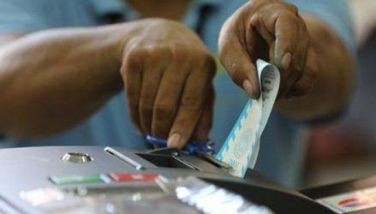Quick count tally for VP passes ‘anomaly tests’
Palace confident of polls’ integrity
MANILA, Philippines – Amid the hash code controversy, the Parish Pastoral Council for Responsible Voting (PPCRV) boosted the credibility of the election results by saying its “anomaly tests” showed the transmitted data were not tampered with.
PPCRV communications director Ana de Villa-Singson yesterday said they conducted the anomaly or integrity check on the data transmitted up to 3:45 p.m. on May 12 and compared them with their data in the two previous automated elections in 2010 and 2013.
“We ran several anomaly tests and I am happy to report there was not a single anomaly,” Singson said.
“Facts do not lie. Numbers do not lie…the data appear to have been untouched,” she added.
Singson made the statement in a news conference in response to allegations that the security of the transparency server had been breached through changing the hash code to make sure the poll results it releases would favor vice presidential candidate Camarines Sur Rep. Leni Robredo.
Singson expressed hope the hash code issue would not be blown out of proportion and people would not allow their emotions to rule over them.
Singson explained that in the past, the PPCRV would only do the anomaly check for their final report.
But with the integrity of the elections being questioned following the hash code controversy, the PPCRV decided to deviate from tradition and release the outcome of their test early, she said.
Singson said they conducted the tests on precincts with problems such as multiple transmissions, delayed transmittal of results, transmittal with more than 95 percent of votes that went to one presidential candidate, exactly 10 votes for vice president and multiple results for a given candidate in different election returns.
Singson said they used to refer to them as “vanishing precincts.”
So far, there have been four reports of these missing precincts, she said.
“There was one cluster precinct in Parañaque City that was reported missing last May 12 and just last May 13, there were three other cluster precincts in Basilan,” she said.
Singson explained that results from the missing precincts was set aside for observation because a vote counting machine (VCM) sent two different kinds of transmissions.
In some instances, a single VCM would send the testing results from the final testing and sealing (FTS) and the real election results.
The system would automatically conduct an audit and set the questioned data aside for clarification. The correct data would then be incorporated back into the counting.
Singson said they also did an analysis on precincts that transmitted even before the 5 p.m. closing time and for precincts that only registered 10 votes for vice president that might have come from the FTS.
She said the PPCRV did not see any irregularity.
There were precincts where 95 percent of the voters have a common a presidential or vice presidential candidate. The PPCRV said this was possible because if compared to the past automated elections, they saw that these areas have a history of favoring a particular bet.
Robredo is leading by just some 200,000-plus votes over Sen. Ferdinand Marcos Jr. in the vice presidential race.
Marcos, who was ahead of the race a few hours after the unofficial tally began after the vote on Monday, questioned the entire electoral process after the program script of the transparency server of the Commission on Elections was altered in the middle of the transmission of votes.
Robredo pulled ahead of Marcos by a slim margin and has maintained her lead until yesterday.
The Comelec has denied cheating allegations made by the Marcos camp in the move to revise part of the programming script.
Comelec Chairman Andres Bautista said the small change in the code was only “cosmetic” and did not compromise the data from the VCMs to the central servers.
Bautista said a programmer from automation supplier Smartmatic merely replaced the letter “ñ” with “n’ in some candidates’ names to address complaints of a media outfit that the “ñ” is being translated to a question mark when displayed.
More credible than before
Malacañang expressed confidence in the integrity of the elections in general.
Presidential Communications Operations Office Secretary Herminio Coloma Jr. said there might have been technical glitches but as a whole, the elections were deemed even more credible than before.
Coloma said it would be up to the poll watchdogs to rate the Comelec as an independent constitutional body and there would always be room for improvement.
“The conduct of elections is the responsibility of the Comelec. This is not under the executive. The only thing we can do is join the call of the people for the elections to be orderly and to have integrity as well,” Coloma said.
“That is why the Comelec is conducting an investigation on the so-called modification in their system. Maybe we should give them a chance first to resolve that issue,” he said.
Singson, on the other hand, called on those who doubt the election results to see the manual audit of the election returns (ER).
She stressed the ERs, copies of which were sent to the PPCRV, cannot be altered.
The PPCRV also compared the speed of the transmission of data of the three automated elections. She said that during the first 24 hours after the closing of the polling precincts, the transmission of the votes last May 9 was faster compared to the 2010 and 2013 elections.
In 2010, they only reached 70 percent of the transmission eight hours after the precincts closed. In 2013, they obtained 70 percent only after 20 hours, while for 2016, it only took four hours for 70 percent of the transmission to come in.
The PPCRV also took note of the huge voter turnout in the Cavite-Laguna-Batangas-Rizal-Quezon (Calabarzon) region (Region 4-A), followed by the National Capital Region (NCR), Metro Manila.
Meanwhile, Singson added that while only 37.18 percent of the votes for overseas absentee voting (OAV) have so far been transmitted to the PPCRV, this was already considered a high rate.
She recalled that in the past two elections, the transmitted OAV were only between 15 to 20 percent. – With Aurea Calica
- Latest
- Trending





























